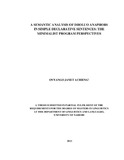| dc.description.abstract | This study investigated the binding theory and theta theory within the Government
and Binding theory and its application to Dholuo simple declarative sentences. The
study further interpreted the binding principles and theta role assignment within
the Minimalist Program. The Minimalist Program’s checking theory and the
Principle of Full Interpretation were elaborated in chapter one.
The investigation revealed that Dholuo was as a pronominal argument language
with no overt noun phrases. In addition, it was established that overt noun phrases
were adjuncts and not arguments referred in pragmatic terms as topic and focus,
and that they could not be assigned any theta role. This idea of topic and focus
brought the mapping between pragmatics and syntax in the study.
Finding shows a modification in the binding principle B, and that Dholuo has two
types of personal pronouns: independent and incorporated. The independent
pronouns occurred as overt pronoun and are referential expressions which were
interpreted as free satisfying the binding principle C. This study argued that
incorporated pronouns violated the binding principle B as they were bound within
the domain of the word. In fact, it was noted that the independent pronouns served
to emphasize the subject being spoken about and was interpreted in pragmatic
terms as topic and focus. In checking the lexical items for grammaticality and
consistency within the Minimalist Program, the study found that the independent
pronouns and incorporated pronouns were interpretable. Further analysis revealed
that the referential expressions in Dholuo included the nouns and independent
pronoun which satisfied the binding condition C of the Government and Binding
theory, and were also interpretable within the Minimalist Program.
Moreover, a modification in the binding principle A was noted in this present
study. Dholuo anaphors were bound within the word domain, unlike in English
where it occurred in the sentence domain. The study revealed that reflexive
occurred as a bound morpheme on the verb. This idea of domain then brought
about contrast on parametric variation in languages on the domain of binding. The
difference between reflexives and reciprocals was illustrated to be established
through the context of the use by the Dholuo speaker.
It was argued that Dholuo words do not move because as a language it has no
agreement and therefore there was no projection for the agreement to be created.
This study further revealed that the binding principles and theta theory were in the
lexicon where they are checked at the logical form for consistency and
grammaticality to satisfy the Principle of Full Interpretation in the Minimalist
Program.
It was concluded that the data from Dholuo falsified the claims of the Minimalist
Program, and that not all the principles of the MP apply in the analysis of Dholuo
such as the merge and move processes. This is because Dholuo a pronominal
argument has no overt arguments in A positions, that includes the fact that it has
no case checking that entails there is no merge because there are no interpretable
number and person features and uninterpretable case features to be merged. The
verb had the arguments incorporated so no case checking takes place on
phonological level. The morphemes which occurred as incorporated arguments
could not be case marked. Therefore a logical type of case checking was done
because features for case checking are not licensed. It is recommended that a
detailed study analyzing pragmatics in simple declarative sentences would shed
more light on the boundaries between semantics and pragmatic in Dholuo
sentences. | en |

